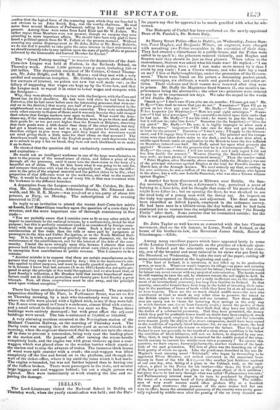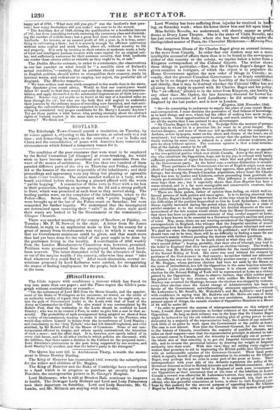IRELAN D.
The Lord-Lieutenant visited the National School in Dublin on Thursday week, when the yearly examination was held ; and the Dul.- lin papers say that he appeared to be much gratified with what he wit- nessed.
The Bishopric of Cashel has been conferred on the newly-appointed Dean of St. Patrick's, Dr. Robert Daly.
At Henry Street Police-office in Dublin, on Wednesday, James Stan- ton, Peter Hughes, and Benjamin Wilson, an engraver, were charged with assaulting two Police-constables in the execution of their duty. They had created a disturbance in a public-house, and the Police were called in to quell it ; the prisoners resisted violently, and Hughes and Stanton said they should do just as they pleased. When taken to the stationhouse, Stanton was asked what his trade was? He replied—" I am the hest trade going, man ; and I can make more money by it than I could by any trade : I am a Crown witness, and who dare lay a hand on me? I live at Ballyboughbridge, under the protection of the Govern- ment.'"fhere were found on his person a detonating pocket-pistol, eight sovereigns, six shillings, a watch and guard-chain, and other ar- ticles. Their violence and their vaunts were renewed after they were in prison. Mr. Duffy the Magistrate fined Stanton 11., one month's im- prisonment being the alternative ; the other two prisoners were ordered to pay 5s. or be imprisoned ten days. We take the sequel in the words of the Dublin Monitor- Ftaunt tn—" I don't care if you give me six months: I'll soon get out." Mr. D. ffy---• Care thall be taken that you do not." Staunton—" Teen I'll go to prison ra her than pay your fine." Mr. Dully—" Remove the prisoner." P. lice Inspector (to Staunton)—" Here are your eight sovereigns.'' Staun- ton—. I had nine sovereigns." The constables declared upon their oaths that he had not. Mr. Duffy—. lace his trick; he wants to pay the fine easily : but it will not do; take him down." Staunton (to the Inspector)—" Give me my pistol." Mr. Duffy—. Do not; it is highly improper to allow such a fellow fire-arms." Inspector—" ni take care he does not get the pistol ; at least for the present." Staunton—. I don't care ; 1'11 apply to the Govern- ment, and I'll engage they'll soon let me out." The prisoner and his compa- nions were then taken down stairs to the dock ; and in a short time after, a middle-aged female made an application to the Bench to have the fine inflicted on Staunton reduced one-half. Mr. Duffy asked her upon what grounds she applied ? Woman—" On the grounds that he is a flovernment-officer." Mr.
Daffy Go away, woman; 1 will not reduce it ; and I only regret I did not tine him double the amount." Woman (leaving the Board-room)—. Ohl very well ; we have plenty of Government-money." Thus the matter ended.
" Peter Hughes, alias Hanratty, above named, (adds the Monitor,) was one of the principal witnesses against Hughes at the trial for Powell's murder in March last, at the Armagh Assizes. We need scarcely say that, according to his own evidence, he Was a ruffian of the deepest dye. Staunton, who figures in the above, has a wife, one Isabella Staunton, who Was also a Crown witness against Hughes."
A murder has been discovered at Miltown near Dublin. On Sun- day morning, Patrick Tynam, a dairyman's boy, perceived a scent of burning in a lime-kiln, and he thought that some of his master's ducks might hive fallen ; but on opening the door, he was shocked to see the dead body of a young man with the throat cut. An lumen on the body was opened on Monday, and adjourned. The dead man has been identified as Alfred Lynch, employed in the ordnance survey. He had bgen seen in a billiard-room the day before, and he had been cautioned not to venture into the _neighbourhood, or cross "she Bloody Fields" after dark. Some surmise that he committed suicide; but the idea is not generally entertained.
Dr. John Taylor so well known as connected with the late Chartist movement, died on the 4th instant, in Larne, North of Ireland, at the house of his brother-in-law, the Reverend James Smith, Rector of Islandmagee.—GloGe.
Among many excellent papers which have appeared lately in some of the London Conservative journals on the practice of wholesale eject- ment in Ireland and the miserable system of tenancy in that coun- try, one of the broadest and most rational in its views was put forth by the Standard, on Wednesday. We take the core of the paper, cutting off some controversial matter at the beginning and end- " The land of Ireland, it is notorious, is not tilled up to its productive power, or near it. Whatever would improve its tillage—as peace and security certainly would—must increase the demand for labour ; hut an increased demand for labour can never concur with any project of extermination. The hands would, he still wanting to turn the soil, by whatever tenure the soil might be held. In fact, an approach, though a clumsy and a sadly inefficient one, to the establish- ment of an intermediate yeomanry, has long been familiar to Ireland. In that country, successful farmers have been long in the habit of investing their earn- ings in the purchase of leases of lands s loch they have let at an advanced rent to terre tenants. These are the so much abused middle-men—the men who contributed at least as much as any other class to preserve the island to the British empire in two rebellions and one invasion. Now these middle- men are surely not to blame for inventing their savings in the only way in which farmers can, (or at least formerly could,) invest the profits of their induct r in Ireland, and it is not their fault that they have not fulfilled all the duties of a substantial yeomanry. Had they been permitted, the money which they paid for profitable leans would no doubt have been employed, much more advanispously employed, by them as farming capital ; and the miserable terre tenants justly the objects of so much compassion, would have been raised to the condition of regularly-hired labourers : for, we say it once more, the land must be tilled, whatever the tenure or whoever the farmer. That the land of Ireland is now too generally in the hands of a class whose condition is far below the condition of hired labourers, will not, we believe, be disputed by any one. Why, then, it may be inquired, is it reserved for the middle period of the nine- teenth century to convert the middle-men into a yeomanry ? To answer this question, we must expose, however:reluctantly, another weakness of the land- lords of the past generation. The love of place was the besetting sin of the Irish gentry of whom we speak. Like the gentleman described in the late Dr Maginn's most amusing novel Whitehall,' who began by demanding tube appointed Prime Minister, and retired contented as the matutinal func- tionary in front of the Old It rey,—or like another :not fictitious aspirant of our own day, who, failing of a place in the Cabinet, took, us the equi- valent, a place in the Police for his brother—like these, the Irish gentry of the last generation looked to place as the great object of their ambition : but place was to be bad only through what was called Parliamentary interest;' and Parliamentary interest must in its turn be purchased by disposing of the votes of a numerous band of forty•sbilling freeholders. The middle- men of very small income could often produce fifty or a hundred of these _poor creatures ; the yeoman of the same means Lad but one vote to offer; hence the substantial yeomanry of the country were pretty gene- rally replaced by middle-men after the passing of the on every account ua-
happy act of 1793. What rent will you give ?' was the landlord's first ques- tion; how many freeholders will you make ? was sure to be the second. "The Auxiliary Act of 1829, raising the qualification to a beneficial interest of 101., has done something towards restoring the yeomanry class and diminish- ing the number of middle-men ; but a great deal more remains to be done by landlords. An income, or an assured profit of 10/. a year, is, it is true, some- thing in cultivating a farm ; but it is scarcely enough for efficient cultivation without some capital and stock besides, above all, without security to life and property. It is only by inviting to their estates at moderate rents, a body of loyal and intelligent yeoman tenants with some capital for an original out- lay, and sufficiently numerous for their common security, that Irish landlords can render these estates either as valuable as they ought to be, or safe."
The Dublin Monitor extracts, in order to corroborate, the observations in our last number on what would be "a sensible view of Ireland's actual condition,"—namely, that its patriots should cease to be tools in English politics, should strive to tranquillize their country, study its internal wants, and endeavour to employ, not reject, the powerful aid of England. The Monitor remarks- " We have seldom read more truth comprised in few words than in the above. The Spectator gives sound advice, Would to God our countrymen would follow it! would to God they would cast aside day-dreams and airy impractica- bilities, and apply themselves to the substantial improvement of their own con- dition! Science may yet enable us to travel at the rate of a hundred miles an hour through the air ; but who are the fools that will neglect to undertake their jourmes by the ordinary means of travelling now furnished, and wait anti- cipating the extraordinary facilities expected to come? Would not persona so acting he considered very proper candidates for Dr. Harty's Lunatic Asylum ? Yet are those parties a whit better, who, prating eternally about the abstract rights of Ireland, neglect in the mean time to secure the improvement of the country ? We think not."



























 Previous page
Previous page